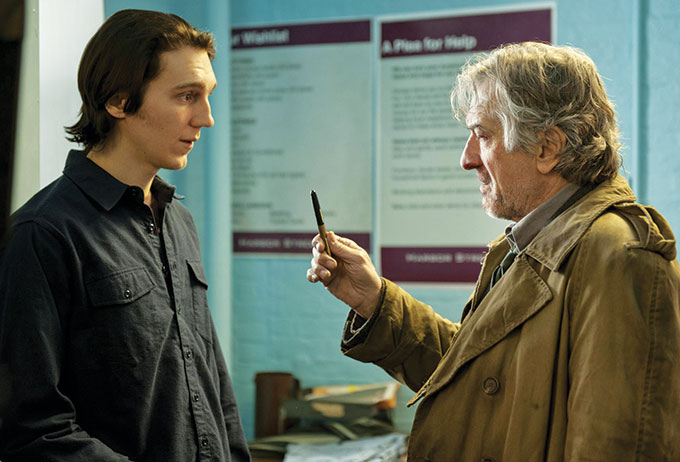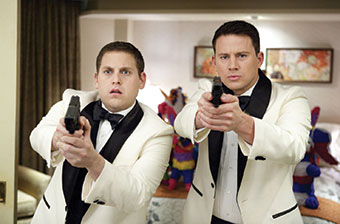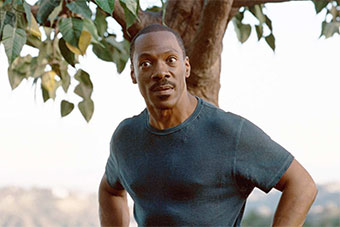In the Blood?
by M. Faust

Robert DeNiro and Paul Dano in Being Flynn. Also, 21 Jump Street, Jeff, Who Lives At Home, John Carter, A Thousand Words
It may be true that writers are especially prone to madness. But being mad isn’t a prerequisite for literary talent: Sometimes it means nothing more than that you’re mad. Nick Flynn (Paul Dano) has trouble admitting to anyone, including himself, that he wants to be a writer. He’s afraid that the desire comes from nothing more than a never-extinguished childhood decision to emulate the father he knows only from letters, many bearing prison postmarks.
Based on the real Nick Flynn’s memoir Another Bullshit Night in Suck City (and what a shame they had to change the title), Being Flynn recounts the time in the late 1980s when he first encountered his father, under less than ideal circumstances for both of them. Nick, at loose ends since the death of his mother a few years earlier, was working at a Boston homeless shelter. One night, one of the men looking for a bed for the night was his father.
Watch trailers for the movies reviewed here on Artvoice TV:
Being Flynn
21 Jump Street
Jeff, Who Lives At Home
John Carter
A Thousand Words
Jonathan Flynn is played by Robert DeNiro, and he is introduced to us with voiceover narration that brings to mind both Taxi Driver’s Travis Bickel and King of Comedy’s Rupert Pupkin. He considers himself one of the three greatest writers in the history of American literature, after Twain and Salinger. “Everything I write is a masterpiece,” he says, and even though he has never published anything, he carries a letter from a major publisher to back up his claim. It’s a rejection letter, calling his submission “a virtuoso display of personality,” and Jonathan clearly has personality to spare. His speech alternates between affectations of elevated discourse and hate-filled rants against gays, blacks, and women. Booze is only a partial excuse.
Jonathan is exactly what Nick is afraid to be—he already has his own problems with alcohol and drugs. His reaction is largely to do nothing, reasoning that sometimes when you reach out a hand to a drowning man in only means you’re both going to drown.
You can’t accuse Being Flynn of prettying up this story any, though at the same time it’s less harsh than the horror stories it contains: You come away with an idea of what it’s like to have to depend on charity to stay out of the cold winter nights in an American city. The real Flynn’s story contains no big emotional climaxes, which frees the movie from having to build to any. That may not be to the taste of audiences who like conventional melodrama (even though they’ve been given a song score to guide them along the movie’s rougher patches). It’s nice to see DeNiro get his teeth into a role worthy of his abilities, and the contrast between him and Dano’s reticence gives the film its considerable sparks.




Like last year’s The Green Hornet, 21 Jump Street has been adapted into a film simply because its star, in this case Jonah Hill, was a fan of it when he was a kid. Hornet was the pet project of Hill’s mentor Seth Rogan, who should have warned him about the consequences of squandering your Hollywood opportunities. It’s played for broad comedy with Hill and Channing Tatum as baby-faced cops assigned to pose as students at a high school beset by a new drug. Like the Simon Pegg comedy Hot Fuzz, it wants to both satirize cop movie clichés and indulge in them. resulting in a mess of a movie. Fans of the original series will appreciate a Johnny Depp cameo, and maybe they’ll even understand it. Otherwise, this scatters a few self-mocking quips (the assigning cop describes the operation in terms clearly meant to mock the endless recycling of old TV shows into movies) on a sea of homophobic dick jokes.
Jeff, Who Lives at Home is the Hollywood debut of Jay and Mark Duplass, brothers at the forefront of the mumblecore movement. It stars Jason Segal in the title role as a 30-year-old slacker content to live in his mother’s basement. I saw it at the Toronto Film Festival last September, and all I remember about it is that Segal is likeable (as always); Susan Sarandon (as his mother) looks better than she has in years; and that I would have left halfway through had there been anything else at that time that I was interested in seeing. But there wasn’t.
The word is out that John Carter is Hollywood’s biggest flop since the last Disney film involving the Red Planet, Mars Needs Moms. I’m not going to tell you that audiences are missing the boat on this one. But I suspect that it will still end up making money internationally: It’s hardly worse than the last Transformers sequel or for that matter any of dozens of special-effects-driven movies that swamped megaplex screens last summer. Did the story make any sense? Not to me, though I’m not a devoted follower of the Edgar Rice Burroughs books it’s based on. Was it hugely recycled, primarily from Star Wars and Avatar? Of course—but why would that hurt it? If I were an optimist, I might hope that this signals an end for audiences’ endless appetites for digital effects movies. But I’m not.
I’m sure no one cheered louder for the spectacular failure of John Carter than the distributors of A Thousand Words, an Eddie Murphy movie that was shot in 2009 but not released to theaters until last week. I went to see it on opening day and was the only person in the theater, though I suspect the sound level in the auditorium wouldn’t have been much different had the place been packed. Murphy plays an agent who, for reasons we won’t go into, becomes cursed by a Bodhi tree. Every time he says or writes something, the tree loses a leaf for each word, and when it runs out of leaves, he can expect to die. I supposed you could take that premise and make a film showing the importance of using words to communicate rather than to manipulate people. But what we have here is pile of stupid comedy with some heavy-handed sentimentality stirred into it. Talking about a book project he wants to peddle, Murphy says, “If anyone can sell some New Age bullshit crap, it’s me.” It’s not at all clear that he’s speaking in character there, though in either case he’s dead wrong.
blog comments powered by Disqus
|
Issue Navigation> Issue Index > v11n11 (week of Thursday, March 15) > In the Blood? This Week's Issue • Artvoice Daily • Artvoice TV • Events Calendar • Classifieds |









 Current Issue
Current Issue